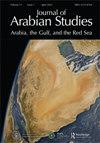Troubled Waters: Insecurity in the Persian Gulf
Q1 Social Sciences
引用次数: 0
Abstract
in the traumatic aftermath of 9/11, Miller records the initial attempts by Saudi officials –– as well as their counterparts in other GCC states –– to cast doubt upon suggestions that the attacks were carried out largely by Saudi citizens, with Bandar bin Sultan suggesting that “if Iran had not targeted Gulf tankers during its war with Iraq in the 1980s... . America would never have entered the region to protect Gulf shipping” (p. 105). Miller concludes that “such denial, diversionary tactics and torturous arguments pointed to the sheer magnitude of the crisis that the 9/11 attacks, bin Laden and Al-Qaeda represented for the Saudi elite” (ibid.). Other chapters in the book examine various aspects of economic diversification and development in the GCC states, and the growth of Dubai, Abu Dhabi, and Doha into aspirant global hubs in the 2000s. While Miller notes that the GCC did achieve technocratic successes in certain areas, such as harmonization of regulations, the final pages of Desert Kingdoms to Global Powers also make clear just how unexpected was the split within the GCC that tore apart the organization in the year after the book was published. Thus, Qatar’s new emir “demonstrated a willingness to heal the worsening rift” between Qatar and Saudi Arabia after he came to power in 2013 (p. 263), but Miller also makes the prophetic, in retrospect, observation that a latent concern existed among other GCC states –– that “Riyadh wants to hijack legitimate security concerns in order to extend its own influence across the region” (p. 267). This happened in 2017 to Qatar, where Miller is based, and any updated edition of this book surely will have an additional chapter on the Gulf rift and its implications for regional politics and international relations. For now, though, Desert Kingdoms to Global Powers succeeds masterfully in explaining how the Gulf states got to where they are, and provides plenty of clues as to where they may go next.动乱水域:波斯湾的不安全
在9/11事件的创伤后,米勒记录了沙特官员——以及其他海湾合作委员会国家的官员——最初试图质疑袭击主要是由沙特公民实施的说法,班达尔·本·苏丹(Bandar bin Sultan)表示,“如果伊朗在20世纪80年代与伊拉克的战争中没有以海湾油轮为目标... .”美国永远不会进入该地区保护海湾航运”(第105页)。米勒的结论是,“这种否认、转移注意力的策略和令人痛苦的争论表明,9/11袭击、本拉登和基地组织对沙特精英代表的危机的绝对严重性”(同上)。书中的其他章节考察了海湾合作委员会国家经济多样化和发展的各个方面,以及迪拜、阿布扎比和多哈在21世纪初成为雄心勃勃的全球中心的发展。虽然米勒指出,海湾合作委员会确实在某些领域取得了技术官僚式的成功,比如法规的协调,但《从沙漠王国到全球大国》的最后几页也清楚地表明,在该书出版后的一年里,海湾合作委员会内部的分裂是多么出人意料,导致该组织四分五裂。因此,卡塔尔的新埃米尔在2013年上台后“表现出了弥合卡塔尔与沙特阿拉伯之间日益恶化的裂痕的意愿”(第263页),但米勒在回顾过去时也提出了一个先见之明的观察,即其他海湾合作委员会国家存在一种潜在的担忧——“利雅得想要利用合理的安全担忧,以便在整个地区扩大自己的影响力”(第267页)。2017年,米勒所在的卡塔尔就发生了这样的事。这本书的任何更新版都肯定会增加一章,讨论海湾裂痕及其对地区政治和国际关系的影响。不过,就目前而言,《从沙漠王国到全球强国》一书成功地解释了海湾国家是如何走到今天的,并为它们下一步的发展提供了大量线索。
本文章由计算机程序翻译,如有差异,请以英文原文为准。
求助全文
约1分钟内获得全文
求助全文

 求助内容:
求助内容: 应助结果提醒方式:
应助结果提醒方式:


